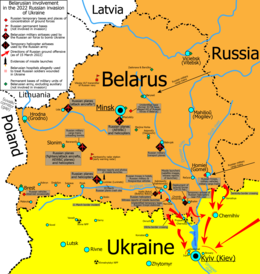

Belarus, a close ally of Russia, has supported its eastern neighbour in the Russian invasion of Ukraine. Before the start of the offensive, Belarus allowed the Russian Armed Forces to perform weeks-long military drills on its territory; however, the Russian troops did not exit the country after they were supposed to finish. Belarus allowed Russia to stage part of the invasion from its territory, giving Russia the shortest possible land route to Ukraine's capital, Kyiv.[1][2][3][4] However, these forces withdrew within two months, thus ceasing land-based military operations originating from Belarus and resulting in the recapture of the Ukrainian side of the border region by Ukraine.[5] Despite this, the situation along the border remains tense, with Ukraine closing the border checkpoints leading into Belarus, bar special cases.[6]
Belarus has also allowed Russian missile launchers to be stationed on its territory and shoot at Ukrainian targets. Several reports emerged among the Belarusian opposition and Ukrainian military that Belarusian troops were in Ukraine fighting together with Russians, but Belarus's leader Aleksander Lukashenko dismissed them and said that the Belarusian Armed Forces (BAF) would not participate directly in the conflict. As of early 2023, the BAF have not been involved in fighting against Ukraine and have remained on the territory of Belarus during the entire course of the conflict. The Belarusian leader has stated that there would be "no way" he would send soldiers into Ukraine unless attacked first.[6][7]
According to the Ukrainian foreign ministry, Lukashenko has assured Ukrainian President Volodymyr Zelenskyy at the start of the invasion that he will not involve his nation's armed forces on the side of Russia.[8] The former stated in early 2023 that Ukraine had offered to formalize this arrangement with a non-aggression pact.[9]
The involvement of Belarus was condemned in Western countries, with the European Union, the United States, United Kingdom, Canada, and Japan imposing sanctions against Belarus. According to Chatham House, Belarus's participation in the military conflict is unpopular among the general population;[10] protests were held on 27 February, the day of the constitutional referendum which asked to revoke Belarus's non-nuclear country status, but were quickly dispersed. Hackers have targeted Belarusian government agencies as well as the country's critical infrastructure, with the aim of disrupting the Russian war effort in Belarus.
In the early days of the invasion, Belarus was also involved in peace initiatives, holding Russo-Ukrainian talks on its border. Despite some preliminary agreements, however, the talks did not result in a lasting ceasefire.[11]
- ^ "Why Russia's Invasion of Ukraine Led to Sanctions on Belarus". Time. 25 February 2022. Archived from the original on 26 February 2022. Retrieved 26 February 2022.
- ^ "Russian Hybrid War Report: Belarus joins conflict against Ukraine". Atlantic Council. 24 February 2022. Archived from the original on 26 February 2022. Retrieved 26 February 2022.
- ^ Coakley, Amanda (24 February 2022). "Lukashenko Is Letting Putin Use Belarus to Attack Ukraine". Foreign Policy. Archived from the original on 26 February 2022. Retrieved 26 February 2022.
- ^ Mallet, Victor (25 February 2022). "Nato alarmed by Belarus role in Ukraine assault". Financial Times. Archived from the original on 25 February 2022. Retrieved 26 February 2022.
- ^ Hart, Robert. "Russian Forces 'Fully Withdrawn' From Northern Ukraine, U.K. Defense Ministry Says". Forbes. Retrieved 16 February 2023.
- ^ a b Pleitgen, Frederik; Ullah, Zahra; Otto, Claudia; Picheta, Rob (16 February 2023). "Belarus claims it won't send troops to Ukraine unless it is attacked, as tensions escalate at border". CNN. Retrieved 16 February 2023.
- ^ Post, Kyiv (16 February 2023). "Belarus Will Only Join Russian Offensive 'If Attacked First' – Lukashenko". Get the Latest Ukraine News Today - KyivPost. Retrieved 17 February 2023.
- ^ "FM Kuleba: Lukashenko assures Zelensky that Belarusian military won't be used against Ukraine". www.ukrinform.net. 27 February 2022. Retrieved 16 February 2023.
- ^ "Ukraine has proposed non-aggression pact with Belarus: President Lukashenko". www.aa.com.tr. Retrieved 16 February 2023.
- ^ "Как Лукашенко втянул Беларусь в конфликт с Украиной и чем это грозит экономике" [How Lukashenka Dragged Belarus into a Conflict with Ukraine and How It Threatens the Economy]. BBC (in Russian). 25 February 2022. Archived from the original on 25 February 2022. Retrieved 26 February 2022.
- ^ "Ukraine and Russia meet at Belarus border but no ceasefire agreement reached". ABC News. Retrieved 16 February 2023.